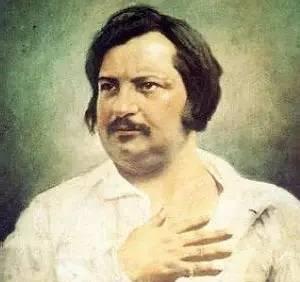When it comes to French critical realist writers, I believe that many people can say a name without thinking, that is, Balzac.

Balzac, whose full name is Honoré de Balzac, was born in May 1799 to a middle-class family in Tours, central France, and he is known as the great Critical Realist writer of the 19th century in France, a "Comedy of Man" containing more than 90 long, medium and short stories, with more than 2,400 characters appearing, and is known as the "encyclopedia of capitalist society", Engels praised Balzac for "providing a history of the excellence of Realism in French "society", especially in Parisian high society" and "in particular". This masterpiece also established the status of a master of Balzac literature because of its realist color and spurred analysis into three points.
The 15th century to the 17th century is the period of geographical discovery, with the opening of new shipping routes, the discovery of the New World, so that the world began to connect into a whole, the exchange between the East and the West is more frequent, according to relevant historical records, around 1660, each year on the East and West shipping lanes opened by Vasco da Gama reached 20,000. Coupled with the influence of European merchants and missionaries to China, in the 18th century Europe formed a ideological level, the admiration of Chinese culture, morality and thought, on the material level, the enthusiasm for Chinese artifacts and tastes, set off a wave of "Chinese fever". Although Balzac, born in 1799, did not catch up with this "China fever", his enthusiasm and curiosity for China were not lower than those of the people at that time.
Ivan Camus, director of the Balzac House in Paris, once said: "Although Balzac has never been to China, he has always had a strong Chinese complex." Balzac's China complex originally stemmed from the influence of books on him. Balzac has loved to read since he was a child, and his father's library, which is comparable to the library collection, is the paradise of his youth, and once, he accidentally saw many historical classics and books about China collected by his father, and after reading them, he became deeply interested in Chinese culture. So that after starting to create works, Balzac also incorporated many Chinese elements into his works, although he did not personally visit China, but one or two of Balzac's friends were travelers who had been to China, supplementing his understanding of China.
The French painter Auguste Borgé is one of them, Auguste traveled to China in the early days of the Opium War, left many precious paintings and drawings, during which he also wrote many long letters for friends in Paris to introduce what he saw and heard in southern China, after returning to China, he combined these letters and paintings into the book "China and Chinese" for publication, based on this book to learn more about China, Balzac also wrote a monograph for his friend's "China and Chinese", In it, he wrote affectionately: "My childhood was spent in the cradle of China and Chinese. ”
After reading extensively about China from all sources, especially, Balzac proudly said: "Theoretically, I have known everything about China, I know everything, and therefore I have the judgment that a society is born with." Perhaps Balzac's words are exaggerated, but it is undeniable that Balzac does know more about certain aspects of China than many Europeans. For example, no one we know of any foreign writer of the same period as Balzac incorporates more Chinese elements into his work than Balzac. According to incomplete statistics, the Chinese objects depicted by Balzac in his works include: various small objects used as decorations, various lacquerware, porcelain and woodware, and various Chinese vases with odd shapes such as long necks or bulging bellies, which are also enough to see the depth of Balzac's love and familiarity with Chinese utensils.
In addition to integrating Chinese elements into the details of utensils and other details, Balzac also integrated his "Chinese complex" into the characters, which is reflected in the background of the characters, physical descriptions, action descriptions, etc., for example: Charlie in "Eugenie Grande" is full of yearning for the land of China and dreams of adventures in the East; Marquis Espar in "Taboo" is a "Chinese fan" who likes to learn Chinese and tell his children about Chinese history; in the description of the appearance of the characters, for example: "The Glory and Disgrace of fireworks women" wrote: "The Glory and Disgrace of fireworks women" wrote: Her skin is delicate, like Chinese rice paper. In Disillusionment, it is written: "Above the beautiful eyes, the eyebrows seem to come from the hand of a Chinese painter", and "Beatrice" writes: "Like a Chinese painter drawing." And so on, there are many Chinese elements integrated into Balzac's works and characters, and his delicate brushstrokes that are three points into the wood are hidden in every word is his love and yearning for Chinese culture.
Balzac never arrived in China in his lifetime, but he filled this gap through numerous related books, surrounding hearsay and rumors, so That China is actually a very far and close place for Balzac, although he recognizes that China is not comprehensive, but how can this fantasy kingdom on the golden fantasy paradise not be the ideal perfect society in Balzac's heart?